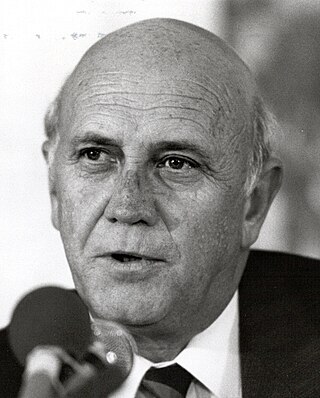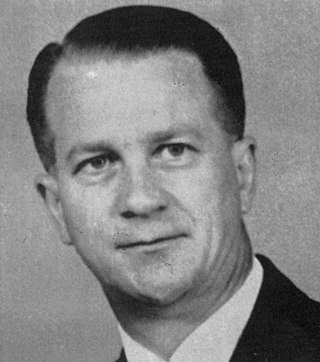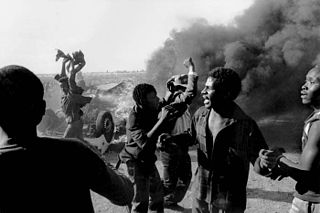
Frederik Willem de Klerk was a South African politician who served as state president of South Africa from 1989 to 1994 and as deputy president from 1994 to 1996. As South Africa's last head of state from the era of white-minority rule, he and his government dismantled the apartheid system and introduced universal suffrage. Ideologically a social conservative and an economic liberal, he led the National Party (NP) from 1989 to 1997.

Pieter Willem Botha, was a South African politician. He served as the last prime minister of South Africa from 1978 to 1984 and the first executive state president of South Africa from 1984 to 1989.

The National Party, also known as the Nationalist Party, was a political party in South Africa from 1914 to 1997, which was responsible for the implementation of apartheid rule. The party was an Afrikaner ethnic nationalist party, which initially promoted the interests of Afrikaners but later became a stalwart promoter and enactor of white supremacy, for which it is best known. It first became the governing party of the country in 1924. It merged with its rival, the SAP, during the Great Depression, and a splinter faction became the official opposition during World War II and returned to power. With the National Party governing South Africa from 4 June 1948 until 9 May 1994, the country for the bulk of this time was only a de jure or partial democracy, as from 1958 onwards non-white people were barred from voting. In 1990, it began to style itself as simply a South African civic nationalist party, and after the fall of apartheid in 1994, attempted to become a moderate conservative one. The party's reputation was damaged irreparably by perpetrating apartheid, and it rebranded itself as the New National Party in 1997 before eventually dissolving in 2005.
1994 in South Africa saw the transition from South Africa's National Party government who had ruled the country since 1948 and had advocated the apartheid system for most of its history, to the African National Congress (ANC) who had been outlawed in South Africa since the 1950s for its opposition to apartheid. The ANC won a majority in the first multiracial election held under universal suffrage. Previously, only white people were allowed to vote. There were some incidents of violence in the Bantustans leading up to the elections as some leaders of the Bantusans opposed participation in the elections, while other citizens wanted to vote and become part of South Africa. There were also bombings aimed at both the African National Congress and the National Party and politically-motivated murders of leaders of the opposing ANC and Inkatha Freedom Party (IFP).
1990 in South Africa saw the official start of the process of ending Apartheid. President of South Africa, eid. President F.W. de Klerk unbanned organisations that were banned by the government including the African National Congress, the South African Communist Party and the Pan Africanist Congress. The African National Congress, Umkhonto we Sizwe, suspends its armed activity within South Africa. Political prisoners including Nelson Mandela were released. Nelson Mandela met ANC leader Oliver Tambo for the first time in 28 years at a meeting in Sweden. Mandela also traveled to England to thank the people for their support in the campaign to free him. South Africa withdrew its troops from Namibia, which was granted independence. 1990 also saw marches in support and against the formation of a new post-Apartheid South Africa.
The following lists events that happened during 1989 in South Africa.
The following lists events that happened during 1991 in South Africa.

Apartheid was a system of institutionalised racial segregation that existed in South Africa and South West Africa from 1948 to the early 1990s. Apartheid was characterised by an authoritarian political culture based on baasskap, which ensured that South Africa was dominated politically, socially, and economically by the nation's minority white population. In this minoritarian system, there was social stratification, where white citizens had the highest status, followed by Indians and Coloureds, then Black Africans. The economic legacy and social effects of apartheid continue to the present day, particularly inequality.

Andries Petrus Treurnicht was a South African politician, Minister of Education during the Soweto Riots and for a short time leader of the National Party in Transvaal. In 1982 he founded and led the Conservative Party of South Africa whose successes among the white electorate made him Leader of the Opposition in 1987, a position he retained until his death.

A referendum on ending apartheid was held in South Africa on 17 March 1992. The referendum was limited to white South African voters, who were asked whether or not they supported the negotiated reforms begun by State President F. W. de Klerk two years earlier, in which he proposed to end the apartheid system that had been implemented since 1948. The result of the election was a large victory for the "yes" side, which ultimately resulted in apartheid being lifted. Universal suffrage was introduced two years later.
The Battle of Ventersdorp was a violent confrontation on 9 August 1991 in the South African town of Ventersdorp between supporters of the far-right Afrikaner Weerstandsbeweging (AWB) and the South African Police and security forces. Though technically not a "battle", it became known as such in the media while official sources such as the Truth and Reconciliation Commission (TRC) simply refer to it as an "incident". Much of its notoriety lies in the fact that it marked the first occasion the South African security forces used lethal force against right-wing white protesters since the National Party's ascension to power in 1948.

Desmond Tutu was a South African Anglican bishop and theologian, known for his work as an anti-apartheid and human rights activist. He was Bishop of Johannesburg from 1985 to 1986 and then Archbishop of Cape Town from 1986 to 1996, in both cases being the first black African to hold the position. Theologically, he sought to fuse ideas from black theology with African theology.

The Bisho massacre occurred on 7 September 1992 in Bisho, in the then nominally independent homeland of Ciskei which is now part of the Eastern Cape in South Africa. Twenty-eight African National Congress supporters and one soldier were shot dead by the Ciskei Defence Force during a protest march when they attempted to enter Bisho to demand the reincorporation of Ciskei into South Africa during the final years of apartheid.

Many people of European heritage in South Africa are descended from Huguenots. Most of these originally settled in the Cape Colony, but were absorbed into the Afrikaner and Afrikaans-speaking population, because they had religious similarities to the Dutch colonists.
The State Security Council (SSC) was formed in South Africa in 1972 to advise the government on the country's national policy and strategy concerning security, its implementation and determining security priorities. Its role changed through the prime ministerships of John Vorster and PW Botha, being little used during the former's and during the latter's, controlling all aspects of South African public's lives by becoming the Cabinet. During those years he would implement a Total National Strategy, Total Counter-revolutionary Strategy and finally in the mid-eighties, established the National Security Management System (NSMS). After FW de Klerk's rise to the role of State President, the Cabinet would eventually regain control of the management of the country. After the 1994 elections a committee called National Intelligence Co-ordinating Committee was formed to advise the South African president on security and intelligence as well as its implementation.

Internal resistance to apartheid in South Africa originated from several independent sectors of South African society and took forms ranging from social movements and passive resistance to guerrilla warfare. Mass action against the ruling National Party (NP) government, coupled with South Africa's growing international isolation and economic sanctions, were instrumental in leading to negotiations to end apartheid, which began formally in 1990 and ended with South Africa's first multiracial elections under a universal franchise in 1994.

On 2 February 1990, the State President of South Africa F. W. de Klerk delivered a speech at the opening of the 1990 session of the Parliament of South Africa in Cape Town in which he announced sweeping reforms that marked the beginning of the negotiated transition from apartheid to constitutional democracy. The reforms promised in the speech included the unbanning of the African National Congress (ANC) and other anti-apartheid organisations, the release of political prisoners including Nelson Mandela, the end of the state of emergency, and a moratorium on the death penalty.

Children of the Light is a documentary film produced by The PeaceJam Foundation about the life of Archbishop Desmond Tutu. It is the first film to tell the life story of Nobel Prize winner Desmond Tutu, one of the fathers of modern-day South Africa, and features extensive archival footage, family photos and never-before-seen interviews. It premiered at the Monte-Carlo Television Festival on June 8, 2014.
The second cabinet of P.W. Botha was formed following his assumption of the position of State President, on 3 September 1984. It was dissolved on 6 September 1989, after Botha's incapacitation following a stroke in January of that year. After Botha's resignation in February, he was replaced by Chris Heunis as acting State President for the remaining few months of the cabinet's term. Heunis was replaced with F.W. de Klerk, who was elected leader of the National Party on 2 February and inaugurated as State President on September 20.

The Vaal uprising was a period of popular revolt in black townships in apartheid South Africa, beginning in the Vaal Triangle on 3 September 1984. Sometimes known as the township revolt and driven both by local grievances and by opposition to apartheid, the uprising lasted two years and affected most regions of the country. The government of P. W. Botha did not succeed in curbing the violence until after it imposed a national state of emergency in June 1986.












